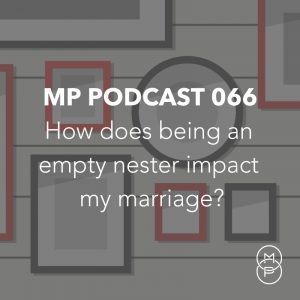 Links
Links
- Brian Bloye’s website
- It’s Personal: Surviving and Thriving on the Journey of Church Planting
- Brian on Twitter
- Amy on Twitter
- West Ridge Church
About our Guests
So much of our culture is focused on parenting and kids. But what happens to your marriage when those move out and move on?
To discuss this important topic with us Ted Lowe sat down for an interview with Brian and Amy Bloye. They’ve recently become empty nesters now that their two sons have grown up. Not only that, but the Bloyes have also been helping married couples for many years as founders of West Ridge Church in Dallas, Ga. They also help plant other churches across the country through the Launch Network.
The Bloyes have some incredible insights on how the local church can help marriages and how couples can navigate the tricky season of being an empty nester. We hope you enjoy the conversation!
A reminder for our listeners—we have a new resource we’ve created called MarriedPeople Membership. It’s an online library for married couples just like you. And it only costs $8/month or $80/year to get access to all of our premium resources in one place.
The Interview
Tell us a little about yourselves.
Brian: Amy and I have been married for almost 26 years. I’ve been in ministry for almost 30 years and was in student ministry for nine years. In 1997, we moved with our two-year-old son to Georgia and started West Ridge Church.
Now, we’re in a new season of our lives where we’re doing more conferences and traveling together. We’re finding life with our kids out of the home and we’ve written a book and done a few other things together in the last year.
How have you kept a great marriage while planting churches and pouring into others?
One of the things we’re passionate about is healthy marriage and family in ministry. But we focus on couples who have started churches and are pastoring them. Pastors are often ones who need the most help in their marriages.
What are some common struggles with marriages in a church plant?
You’re invested all in. When you move to a new city to start a church (or even start a business together), you’re all in. It’s a personal thing for you, your spouse and your kids. You’re taking a step of faith together and it impacts every part of your life.
Churches are just like kids—they have different stages of life and you have to adjust to the phases of the organization and your family. It puts a lot of strain on your marriage and family. We see some unhealthy things sneak in and we want to help couples during those times.
How do you set the limits on work to keep it from impacting your family?
We encourage couples to build healthiness in from the very beginning. A lot of people don’t take time off because they’re going to rest ‘when this happens’. But that rarely ever happens. So we encourage people to build in rest at the beginning.
You have to build in the rest and health rhythms, and you have to put boundaries around your home life. Usually, driven people start churches and organizations, so they start one thing and move on to the next thing. And they have driven children.
Brian: To be honest, we didn’t do very well with this early on. I’ll tell you how things changed for us. I came from a student ministry world that was very busy. We kept a crazy pace going that continued to our church plant. We ran at such a heavy pace that it was impacting the behavior of our oldest son. When our second son was born, he copied the behavior of his brother. I sat down with Andy Stanley and asked him how I keep the church moving forward without losing my marriage and kids. Andy said, “You have to choose to cheat”. He told me I had to cheat the church on behalf of my family. He told me that God never promises to make up for misguided priorities. He helped me see what it’d look like to go from 75-80 hours a week down to 45-50 hours. I realized there was such a lack of boundaries and rhythms in people’s homes and family life. We became passionate about bringing that into our own home and helping others.
Amy: If you can cheat the church and focus on your marriage and family, when you become an empty nester you can be healthy. You’re going to cheat something, just make sure you’re not cheating at home.
How did you feel in that season of extreme busyness?
Amy: I was so committed to make this work with Brian; we were so committed to what we were doing. I got to the point where I felt like we were just holding on. We were so excited about what we felt God had called us to do, we thought we’d do whatever it takes.
But we were so unhealthy in our thinking, we didn’t know we should be valuing time margins. You can do so much more if you have margin in your life so you can be spontaneous and hang out with your kids. And they know they’re more important to us than the work.
How could you tell the pace was impacting your kids?
Brian: Obviously, their behavior. They’re both very driven, high spirited kids and we love that about them. I wasn’t around enough to be the consistent person who brought stability. I’ve learned over the years that time and talking is so important.
Back then, every time the phone rang, I would pick it up—no matter what I was doing. I remember one time, I was on the floor playing with Taylor and about three times it rang and I picked it up. When I came back, he wasn’t there. Amy told me I was sending a message to him—that whoever was on the phone was more important than him.
Why is taking a day off so important for your marriage?
Amy: Brian takes Fridays off and so does the entire staff, unless something crazy happens. They close the church building. We usually go out to a movie, go to lunch and get refueled. We go really hard Monday through Thursday. On Friday, we know rest is coming. Couples always need to have something to look forward to together—a trip or just a day off.
Brian: I heard this phrase yesterday from someone who said to “always have a mountain in front of you that scares you just a little bit”. We always try to have something in front of us that we’re looking to together – whether it’s traveling together or speaking together, a challenge.
Amy is speaking into spouses and raising healthy kids. Getting this off the ground is a huge challenge we’re tackling together. We’ve also started taking our missionaries from all over the world and getting them together and speaking to them. We also always look at the next place we want to travel to together.
What do you guys think about seeking marriage counseling?
Amy: Brian brought a counselor to our staff when we went through a difficult time as a church. The counselor had some open slots. And Brian asked if we wanted to meet with him. By the time we got in there, both of us were in tears. He had unpacked stuff we didn’t realize we had. Everyone has issues and if we can make our marriage healthier—it’s something we don’t want to miss out on.
We all have junk we bring into our marriage and bring our baggage in. Sometimes, it feels like it could get better but we’re afraid of the pain or of things blowing up. But you have to go through pain sometimes for things to get better but it’s worth it. If you make the commitment that you’re not going to give up on it, you can get anywhere. If you’re willing to stay in it and get through the pain, it’s so worth it. We’re so much healthier as a result of it.
What was it like when your first son moved out of the house?
Brian: I remember when we took our oldest son to college. People told us it’d be tough and it was just as tough as people said. Our oldest son actually came back and is living with us again. He plays pro baseball and is with us in the off-season. There are big adjustments at every level.
You almost have to learn how to re-parent. We have to figure out how to put boundaries and see where they’re asking for advice and where we have to stop giving it. A few years ago, I interviewed Andy Stanley and asked how you know you’ve done well as a parent. He said if they want to come back home and hang out with you.
Why do you think the divorce rate is so high for empty-nesters?
Amy: So many of our friends have poured themselves completely into their kids. I sat on the bleachers for so many years with baseball moms and then when the last season was over and the kids left and went to college, some of those parents didn’t know each other.
When our boys were little, we would go on a trip or go somewhere overnight or go on date night and leave the kids with a babysitter. I remember them being so upset, but as they got older they realized we were modeling for them what it’s like for our family not to revolve around the kids and their schedule. They’re an important part, but not the center of the family.
I would encourage people to focus on the marriage and have fun together so when the kids are gone you’re still having fun together.
Your one simple thing this week
Have fun together and take time off to rest together.
Show Closing
Thanks for joining us for the Married People Podcast. We hope you’ll subscribe to the podcast on iTunes and leave a review – they help us make the podcast better.
We want to hear from you! Share with us on Facebook, Instagram or our site. If you want more resources, check out Your Best Us.
To find more from Brian and Amy Bloye, you can check out their book It’s Personal: Surviving and Thriving on the Journey of Church Planting.





